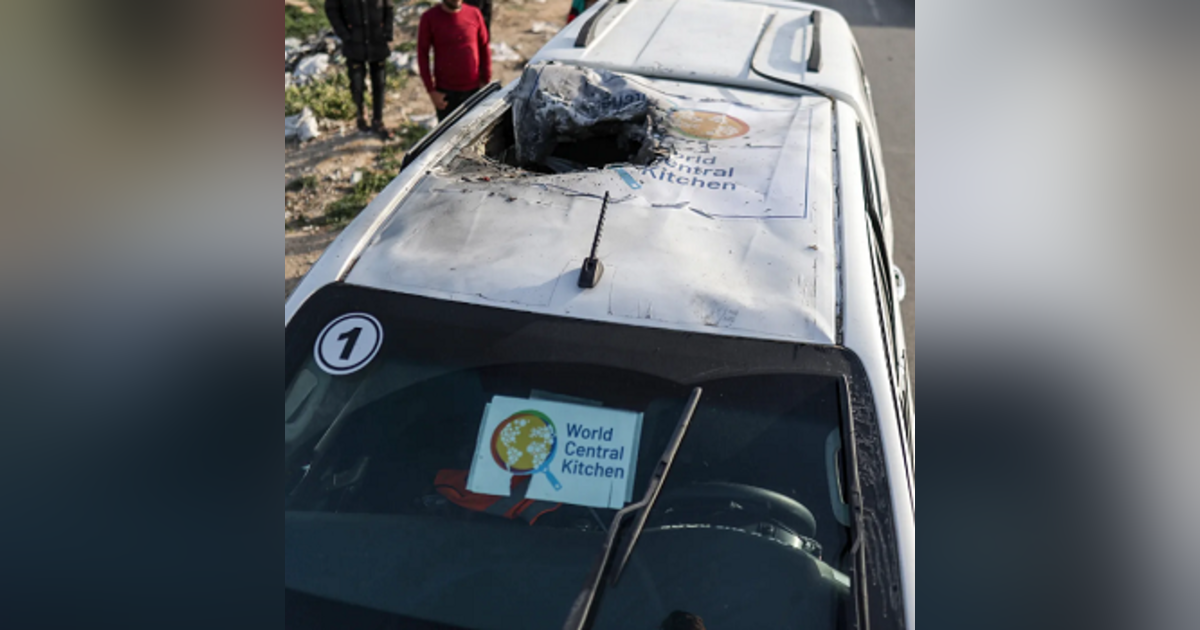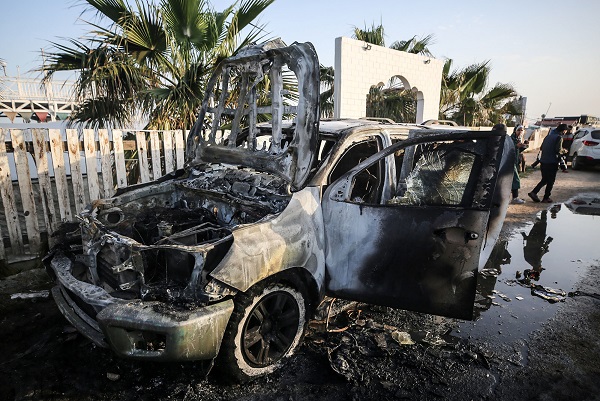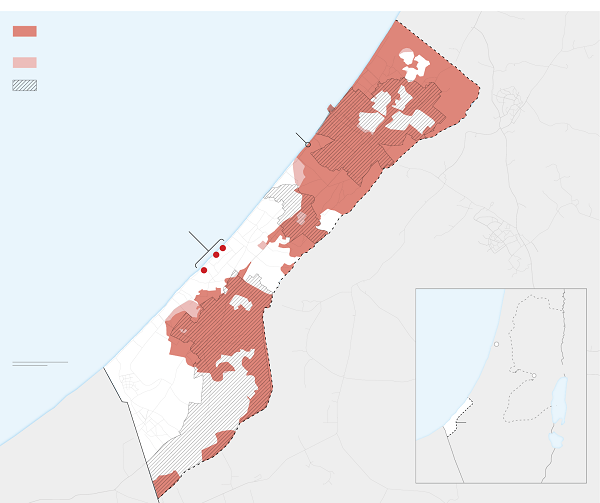Targeting Aid - The World Central Kitchen Tragedy

On April 2, 2024, several cars were driving to render aid with food for those in Gaza dealing with starvation. Prime Minister Benjamin Netanyahu, who described the attack on the convoy as unintentional, called the loss of innocent life as a “tragic case,” adding: “This happens in wartime.”
supporting links
1. World Central Kitchen [website]
2. The World Central Kitchen Aid Workers Killed in Gaza [TIME Magazine]
3. Chef Jose Andres: Israel targeted his aid workers 'systematically, car by car' [REUTERS]
4. Jose Andres, Fights with A Spatula Instead of A Gun [That’s Life, I Swear Podcast]
5. Erin Gore, WCK CEO [LinkedIn]
6. Attacks on humanitarian workers [Wikipedia]
7. Major attacks on aid workers: Summary statistics [Aid Workers Security Org]
Contact That's Life, I Swear
- Tweet us at @RedPhantom
- Listen to audios:
-Apple https://apple.co/3MAFxhb
-Google https://bit.ly/3L2K4Iu
-Spotify https://spoti.fi/3xCzww4
-My Website: https://bit.ly/39CE9MB - Email us at https://www.thatslifeiswear.com/contact/
- Music and/or Sound Effects are courtesy of Pixabay
- If you like to leave a review for an episode, please submit on Apple Podcast or on my website
- Do you have topics of interest you'd like to hear for future podcasts? If so please email us at: https://www.thatslifeiswear.com/contact/
Thank you for following the That's Life I Swear podcast!!
8 min read
On April 2, 2024, several cars were driving to render aid with food for those in Gaza dealing with starvation. Without notice, the vehicles were destroyed, killing the occupants. It was an event that shook the world to its core. Israeli military missiles found their target not on enemy grounds but on this humanitarian convoy led by the renowned World Central Kitchen. This devastating attack sparked international outrage and raised profound questions about the cost of conflict and the safety of aid workers.
Welcome to That's Life, I Swear. This podcast is about life's happenings in this world that conjure up such words as intriguing, frightening, life-changing, inspiring, and more. I'm Rick Barron your host.
That said, here's the rest of this story
The tragic attack on World Central Kitchen was no isolated event.
When the Israeli military launched missiles at a humanitarian convoy operated by the renowned international charity World Central Kitchen, the horrific incident resulted in the deaths of seven aid workers, most of them foreign nationals. This brazen attack sent shockwaves across the globe. Although Israeli Prime Minister Benjamin Netanyahu described it as an unintentional "tragic case", what struck me was his caviler and pathetic condolence remarks when he said “This happens in wartime.”
One of the World Central Kitchen cars that was hit. Courtesy of: Getty Images
Aid workers worldwide courageously carry out their missions in conflict zones under dangerous conditions. Over the years, aid workers who have put their lives on the line have died in such places a Somalia, Afghanistan, Syria, Iraq, and most recently in Ukraine.
Protocols exist to safeguard the security of aid workers to the greatest extent possible. A crucial component in what is called the "deconfliction" process is that it aids organizations continuously coordinate with relevant military forces, notifying them of their movements and locations to avoid being targeted.
World Central Kitchen confirmed its personnel were traveling through a deconflicted area in two armored vehicles and a third marked car when the missiles struck their convoy. Film footage depicted one vehicle with a massive hole punctured through its roof; the charity's prominent logo, clearly on the roof of the car, offered no protection. Erin Gore, the organization's CEO, condemned the attack as "unforgivable" - a blatant violation of the principles meant to shield humanitarian workers.
What happened to WCK aid workers in Gaza?
In a tragic turn of events, World Central Kitchen (WCK) aid workers found themselves in the crossfire as they departed a warehouse in Gaza, traveling in two armored vehicles clearly identified with the distinctive WCK logo. Despite meticulous coordination with the Israel Defense Forces (IDF), the convoy fell victim to devastating airstrikes, as disclosed by the nonprofit in a recent press release.
A succession of critical mistakes led the Israeli troops to mistakenly open fire on the humanitarian convoy, the military's preliminary inquiry findings revealed. The drone footage, as per the inquiry, failed to capture the organization's logo in the darkness; some officers neglected to review documentation indicating the convoy included civilian vehicles; and a drone operator had incorrectly identified an aid worker, likely carrying a bag, as an armed member of a Palestinian group displaying a gun.
The seven aid workers had arrived in northern Gaza earlier that Monday to assist in delivering over 100 tons of food aid, according to World Central Kitchen. Their trucks departed around 9 p.m., heading southward towards the group's warehouse, the Israeli military stated.
Additional cars joined the convoy of trucks along the coastal road, the military reported. Shortly after, a gunman appeared to fire a single round from the roof of one of the trucks, according to an Israeli military officer overseeing the military's investigations into potential cases of wartime misconduct.
The red dots represent where the World Central Kitchen cars were hit inside the Gaza Strip. Courtesy of: CNN
The drone operator and their commanding officers were unaware that the additional cars were part of the approved humanitarian convoy and wrongly assumed they were transporting armed Palestinians, the Israeli officials explained.
When questioned about why the soldiers lacked this information, the military officer stated that certain officers had failed to consult the coordination documentation. "No excuses," the officer said, acknowledging the communication failure.
The heart-wrenching toll of the attack reverberated across continents as the bombing claimed the lives of seven aid workers hailing from Australia, Poland, the United Kingdom, and Palestine, including one individual holding dual citizenship in the United States and Canada. British Foreign Secretary David Cameron confirmed the loss of three British nationals in a poignant message shared with the world.
The stark reality of working in Gaza during wartime was articulated by Jamie McGoldrick, the interim UN Humanitarian Coordinator for the Occupied Palestinian Territory, who through a press release, described the region's transformation into "one of the world's most dangerous and challenging environments."
Since hostilities escalated on October 7th, a staggering 203 aid workers have perished, according to the Aid Worker Security Database's grim global tallies. This toll tragically eclipses the yearly averages of aid worker fatalities worldwide, underscoring the harrowing risks confronting those endeavoring to alleviate suffering amidst the crucible of warfare.
Most likely, the 203 aid workers who have died thus far, will continue to climb.
The World Central Kitchen organization has called on Australia, Canada, the U.S., Poland, and the U.K. to join it in demanding an independent investigation to determine whether the attack was intentional or violated international law.
In a statement released from, World Central Kitchen's CEO, Erin Gore, she expressed profound dismay, asserting, "This is not only an attack against WCK, this is an attack on humanitarian organizations showing up in the most dire of situations where food is being used as a weapon of war."
The renowned chef José Andrés, founder of the humanitarian organization, vehemently dismissed the Israeli Prime Minister's claim that the devastating strike on the convoy was an accident. When speaking with Reuters correspondents, Jose stated, and I quote:
"This tragic occurrence cannot be brushed aside as mere misfortune or a wayward bomb drop. The precision and sequence of the strikes suggest a deliberate attack."
End quote
Although Israeli authorities pledged an internal probe, World Central Kitchen insisted only an independent investigation could uncover the truth, ensure accountability for the perpetrators, and prevent future assaults on those rendering aid while under the umbrella of heavy conflict.
The heartbreaking assault on Andrés' relief workers, while profoundly disturbing, was not entirely unforeseen. Gaza has emerged as one of the most challenging theaters for humanitarian personnel during Israel's protracted offensive to uproot Hamas militants.
Arvind Das witnessed the harsh realities aid workers face in Gaza. As the team leader for the U.S.-based International Rescue Committee's response to the crisis, he had seen how the usual assurances of safe access were disregarded. In this conflict, targeting those trying to deliver life-saving aid seemed to be the norm rather than an aberration.
On January 18th, Das experienced this danger firsthand. He was part of a joint U.S.-U.K. medical mission operating from a residential compound in the coastal town of Al-Mawasi. This location had been designated a safe zone, and its coordinates shared with Israeli authorities through official channels. Yet the unthinkable occurred - an Israeli airstrike hit the compound while Das and a group of doctors were inside.
Astonishingly, they all survived, though with injuries. Das knew their fortune could have easily turned to tragedy that day. Three months later, the Israeli military had not explained why they targeted the compound housing medical personnel. Requests for comment went unanswered, leaving Das and his colleagues to grapple with the fact that even transferred coordinates did not protect you.
The targeting of aid workers was unfortunately not an isolated incident in Gaza, Arvind Das solemnly noted. Among his extensive experience in conflict zones like Iraq, Syria, Afghanistan, central Africa, and Ecuador, the situation in Gaza stood out as uniquely dangerous. "Almost every international organization has faced similar threats at one point or another," he said. "But it's the sustained pattern that is so deeply concerning."
The dangers extended far beyond just those trying to deliver humanitarian aid. Journalists, too, found themselves in the crosshairs at an alarming rate. Since October 7th, at least 95 journalists had been killed in Gaza according to the Committee to Protect Journalists - making this the deadliest period the NGO had recorded since beginning casualty tracking in 1992.
Healthcare workers were also devastatingly impacted. Christina Wille, director of the humanitarian research group Insecurity Insight, told TIME that her organization had identified the location and date for at least 176 healthcare worker deaths in Gaza. However, she gravely added, the true toll was thought to surpass 450 lives lost.
For Das and others on the ground, the sheer scale of the violence against civilian protectors and journalists laid bare the exceptionality of Gaza's humanitarian crisis.
Omar Shakir, the Israel and Palestine director at Human Rights Watch, painted a grim picture of the Israeli government's actions in Gaza. "There is a decades-long track record of grave violations of the laws of war, including war crimes," he told TIME. Shakir noted that HRW had documented unlawful indiscriminate airstrikes as well as attacks on hospitals and ambulances.
"It's precisely this decade of impunity for unlawful attacks and other grave abuses, including Israel's segregation against Palestinians, that has led to the unprecedented atrocities we've witnessed over the last six months," he said grimly.
The deadly strike on a World Central Kitchen aid convoy has focused greater international scrutiny on how Israel has conducted its war in Gaza, now entering its sixth month. Responses from world leaders, including Israel's closest allies in the U.S., U.K., and Europe, described the attack as "appalling." They stressed that "far too many aid workers and ordinary civilians have lost their lives" and that "Israel has not done enough to protect those trying to deliver desperately needed aid."
While representing some of the strongest public rebukes of Israel's conduct so far, it remained unclear whether these statements would precipitate any real change. For critics like Shakir, the concern was that the longstanding pattern of violations would persist without accountability.
For now, the World Central Kitchen, has suspended its operations in Gaza after seven of its workers were killed by an Israeli Defense Force attack.
The International Rescue Committee sounded the alarm over the desperate grim situation of expectant mothers and those with children in the Gaza Strip. These at-risk populations are fighting to endure dire shortfalls of food provisions, drinkable water, and medical services – all while famine cast its menacing shadow, the group cautioned. Amid the crisis, the World Health Organization said it completed a “highly complex mission” delivering medical aid to hospitals in northern Gaza
At the time of this recording, the Israel Defense Forces fired two of its officers and reprimanded others for their involvement in the strikes. Still, the WCK charity said Israel could not be trusted to investigate its own errors in Gaza.
What can we learn from this story? What's the takeaway?
I’ll let the words of Chef Jose Andres define the learning and takeaway, from a tweet he posted on April 3rd, one day after the bombing:
The seven angels killed on a @WCKitchen mission in Gaza on Monday were the best of humanity.
The Israeli government needs to open more land routes for food and medicine today. It needs to stop killing civilians and aid workers today. It needs to start the long journey to peace today.
You cannot save the hostages by bombing every building in Gaza. You cannot win this war by starving an entire population.
Source: José Andrés: Let People Eat Guest Essay on New York Times
Well, there you go, my friends; that's life, I swear
For further information regarding the material covered in this episode, I invite you to visit my website, which you can find on Apple Podcasts, for show notes calling out key pieces of content mentioned and the episode transcript.
As always, I thank you for the privilege of you listening and your interest.
Be sure to subscribe here or wherever you get your podcast so you don't miss an episode. See you soon.










